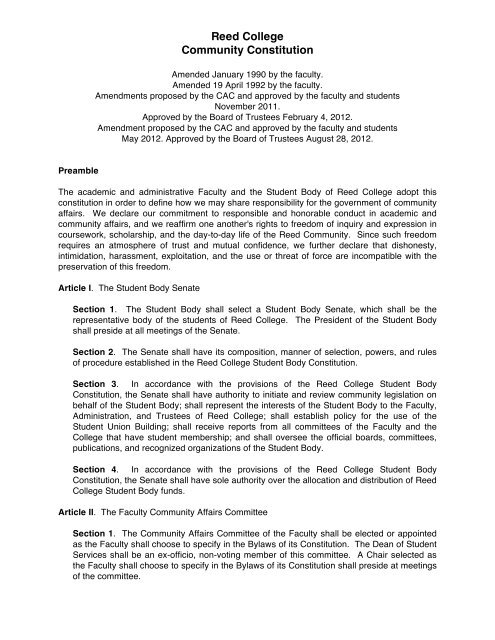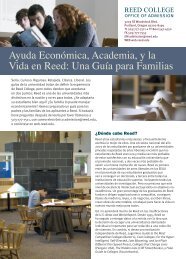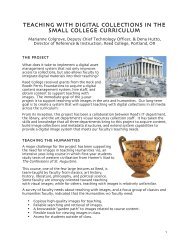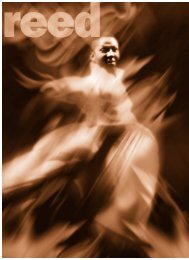Community Constitution Master - Reed College
Community Constitution Master - Reed College
Community Constitution Master - Reed College
Create successful ePaper yourself
Turn your PDF publications into a flip-book with our unique Google optimized e-Paper software.
<strong>Reed</strong> <strong>College</strong><strong>Community</strong> <strong>Constitution</strong>Amended January 1990 by the faculty.Amended 19 April 1992 by the faculty.Amendments proposed by the CAC and approved by the faculty and studentsNovember 2011.Approved by the Board of Trustees February 4, 2012.Amendment proposed by the CAC and approved by the faculty and studentsMay 2012. Approved by the Board of Trustees August 28, 2012.PreambleThe academic and administrative Faculty and the Student Body of <strong>Reed</strong> <strong>College</strong> adopt thisconstitution in order to define how we may share responsibility for the government of communityaffairs. We declare our commitment to responsible and honorable conduct in academic andcommunity affairs, and we reaffirm one another's rights to freedom of inquiry and expression incoursework, scholarship, and the day-to-day life of the <strong>Reed</strong> <strong>Community</strong>. Since such freedomrequires an atmosphere of trust and mutual confidence, we further declare that dishonesty,intimidation, harassment, exploitation, and the use or threat of force are incompatible with thepreservation of this freedom.Article I. The Student Body SenateSection 1. The Student Body shall select a Student Body Senate, which shall be therepresentative body of the students of <strong>Reed</strong> <strong>College</strong>. The President of the Student Bodyshall preside at all meetings of the Senate.Section 2. The Senate shall have its composition, manner of selection, powers, and rulesof procedure established in the <strong>Reed</strong> <strong>College</strong> Student Body <strong>Constitution</strong>.Section 3. In accordance with the provisions of the <strong>Reed</strong> <strong>College</strong> Student Body<strong>Constitution</strong>, the Senate shall have authority to initiate and review community legislation onbehalf of the Student Body; shall represent the interests of the Student Body to the Faculty,Administration, and Trustees of <strong>Reed</strong> <strong>College</strong>; shall establish policy for the use of theStudent Union Building; shall receive reports from all committees of the Faculty and the<strong>College</strong> that have student membership; and shall oversee the official boards, committees,publications, and recognized organizations of the Student Body.Section 4. In accordance with the provisions of the <strong>Reed</strong> <strong>College</strong> Student Body<strong>Constitution</strong>, the Senate shall have sole authority over the allocation and distribution of <strong>Reed</strong><strong>College</strong> Student Body funds.Article II. The Faculty <strong>Community</strong> Affairs CommitteeSection 1. The <strong>Community</strong> Affairs Committee of the Faculty shall be elected or appointedas the Faculty shall choose to specify in the Bylaws of its <strong>Constitution</strong>. The Dean of StudentServices shall be an ex-officio, non-voting member of this committee. A Chair selected asthe Faculty shall choose to specify in the Bylaws of its <strong>Constitution</strong> shall preside at meetingsof the committee.
Section 2. In consultation with the Student Body Senate and the <strong>Community</strong> AffairsCommittee of the Faculty, the President of the <strong>College</strong> shall at the beginning of eachacademic year appoint an Honor Council, chaired by a member of the Faculty, andcomposed of an equal number of students, faculty, and members of the staff. The HonorCouncil shall be responsible for educating incoming members of the community about themeaning and importance of responsible and honorable conduct at <strong>Reed</strong> <strong>College</strong>. Inaccordance with the procedures referred to in Section 1 of this article, members of the HonorCouncil shall provide advice to persons seeking informal or formal resolution of disputes,may serve themselves as mediators in disputes, or may refer disputants to designatedmediators. The Chair of the Honor Council shall receive confidential reports of the progressand outcome of mediation undertaken under the Council's auspices.Section 3. The Honor Council shall provide the <strong>Community</strong> with routine summaries of itsactivities, and shall from time to time report to the <strong>Community</strong> about larger issues andproblems concerning honorable conduct and the <strong>College</strong>'s grievance and judicialprocedures.Section 4. If informal procedures fail, every member of the Faculty, Staff, and Student Bodyhas the right to bring a formal complaint against a member of the <strong>Reed</strong> <strong>Community</strong>, andhave that complaint considered by an appropriate hearing board. Persons filing formalcomplaints shall be notified by the hearing board about the progress and outcome of theircomplaints. Unless all persons involved in a dispute agree otherwise, complainants shallpreserve strict confidentiality about the content of such notification.Section 5. The Student Judicial Board and the Sexual Misconduct Board shall hear formalcomplaints brought against students. The composition and procedures of the Boards shallbe set forth in the Student Judicial Board Code, which shall be enacted and amendedaccording to the processes established in Article III of this constitution. The deliberationsand recommendations of the Boards shall be held confidential by their members. Formalcomplaints against students must be filed with the Chair of the appropriate Board, with acopy of the complaint to the Dean of Student Services. Decisions of the Boards shall be inthe form of recommendations to the President of the <strong>College</strong>. Such recommendations shallbe made in writing, and reported to the offices of the President and the Dean of StudentServices. In accordance with procedures set forth in the Student Judicial Board Code,decisions of the Boards may be appealed to the Appeals Board. A final appeal may bemade to the President of the <strong>College</strong>.Section 6. The Faculty (or individual members of the Faculty) may delegate to the StudentJudicial Board authority to judge cases of academic dishonesty and recommend penalties tothe Faculty and the President of the <strong>College</strong>. In such cases, the faculty members of theAdministration Committee of the Faculty shall review, and after consultation with the Chair ofthe Student Judicial Board, may amend the judgments and recommended penalties of theStudent Judicial Board. Nothing in this section shall be construed to relieve a facultymember of the responsibility for assigning grades to any student in his or her course.Section 7. Formal complaints against members of the Faculty shall be heard according tothe procedures set forth in the Rules of Procedure of the Faculty. Formal complaints againstmembers of the Faculty must be filed with the Provost.4
Section 8. Formal complaints against <strong>College</strong> staff members shall be heard according toprocedures set forth in the Staff Handbook. Formal complaints against staff members mustbe filed with the Director of Personnel Services, or with the staff member's direct supervisor.Section 9. Records of the disposition of formal complaints, and of mediated disputesresulting in acknowledgment of injury to a community member or of a breach of honor, shallbe kept in confidential disciplinary files separate from all other records pertaining to anaccused party. The Dean of Student Services shall keep, maintain, and protect suchrecords for students, the Provost for faculty members, and the Director of PersonnelServices for staff members. Disciplinary records shall be maintained for the duration ofenrollment or employment at the <strong>College</strong>, or longer if legally required, and shall be destroyedat the end of that period.Section 10. The Rules of Procedure of the Faculty, the Student Judicial Board Code, andthe Staff Handbook may specify circumstances in which the Provost, the Dean of StudentServices, and the Director of Personnel Services may provide appropriate hearing boardsand committees with information from the files in their respective official custody.Section 11. The rules of procedure for initiating and pursuing informal and formalcomplaints against members of the <strong>Reed</strong> <strong>Community</strong> shall be published each academicyear.Article V. CommitteesSection 1. Apart from committees established under the Bylaws of the <strong>Reed</strong> Institute, thereshall be only three kinds of committees at <strong>Reed</strong> <strong>College</strong>: those established under the<strong>Constitution</strong> and Bylaws of the Faculty, those established under the Student Body<strong>Constitution</strong>, and those established under this <strong>Community</strong> <strong>Constitution</strong>.Section 2. Except for committees (such as the Committee on Advancement and Tenure)dealing primarily with personnel issues, or committees (such as the AdministrationCommittee and the Graduate Awards Committee) dealing with student academic standingand awards, or committees dealing with programs (such as graduate study) not designed forundergraduates, all committees established under the <strong>Constitution</strong> and Bylaws of theFaculty shall either have voting student members or shall work in relation to such parallelcommittees as may be established under the Student Body <strong>Constitution</strong>.Section 3. When parallel committees (such as the Faculty and Student Committees onAcademic Policy and Planning) have been established, the faculty and student committeesshall meet together at least once each semester, and at any other reasonable time wheneither committee requests a joint meeting. Student committees shall routinely send to theirfaculty counterparts copies of all their minutes, memoranda, working documents, andrecommendations, except those pertaining to meetings defined as "closed" to the communityat large in the Bylaws of the <strong>Constitution</strong> of the <strong>Reed</strong> <strong>College</strong> Student Body. Facultycommittees shall routinely send to their student counterparts copies of all their minutes,memoranda, working documents, and recommendations, except those pertaining tomeetings defined as "closed" to the Faculty at large in the Bylaws of the <strong>Constitution</strong> of theFaculty.5
Section 4. The Student Body Senate may recommend to any committee of the Faculty thatit address a problem that has come to the Senate's attention. All committees of the Facultythat have student membership shall report to the Student Body Senate on their proceedingsat least once each semester. Committees of the Faculty report their recommendations foraction to the Faculty and/or the President of the <strong>College</strong>. Committees established under theStudent Body <strong>Constitution</strong> report their recommendations for action to the Student BodySenate.Section 5. Agenda CommitteeA. The Agenda Committee shall consist of the President of the Student Body, theChair of the Student Committee on Academic Planning and Policy, and a studentmember of the Honor Council, together with the Chair of the <strong>Community</strong> AffairsCommittee, the Dean of Student Services, the Provost, and the Vice-President/Treasurer. The Committee shall select a chair from among its members,and its meetings shall be open to the community.B. The Agenda Committee shall facilitate communication among the variousconstituencies of the <strong>College</strong> on matters pertaining to the well-being of the <strong>Reed</strong><strong>Community</strong> as a whole. It shall have the responsibility of ensuring that such matterscome in a timely fashion before the representative and advisory bodies established bythis constitution. It shall provide for appropriate publicity of the discussion of suchmatters, and of the conclusions reached. It shall receive minutes from the StudentBody Senate and the <strong>Community</strong> Affairs Committee, shall keep these on file in theDeans' Office for one academic year, and shall subsequently deposit copies of theseminutes in the Student Body Archives and in the <strong>Reed</strong> <strong>College</strong> Archives.C. The Agenda Committee shall meet at least once every two weeks while classes arein session. When classes are not in session, the Committee shall meet at the call ofits chair or of any two members, or of their designated proxies.Section 6. In a manner consistent with the <strong>Constitution</strong> and Bylaws of the Faculty and the<strong>Constitution</strong> and Bylaws of the <strong>Reed</strong> <strong>College</strong> Student Body, the Faculty and the StudentBody Senate may create and dissolve other joint committees as they see fit.Article VI. Publications and Public Occasions of ExpressionSection 1. Publications, exhibitions, public lectures, and public performances under thesponsorship of the <strong>College</strong> or of recognized organizations within the <strong>Reed</strong> <strong>Community</strong> shallnot be subject to institutional censorship. Publications supported wholly by Student Bodyfunds, or by Student Body funds supplemented by revenues external to the <strong>College</strong>, shallnot be subject to censorship or editorial control by the <strong>College</strong>, by the Student Body Senate,or by any member of the academic or administrative faculty. Official publications of the<strong>College</strong>, however, shall be subject to editorial control by appropriate institutional officers.Section 2. Editors of publications under the sponsorship of the <strong>College</strong> or of recognizedorganizations within the <strong>Reed</strong> <strong>Community</strong>, including publications supported in whole or partby Student Body funds, shall adhere to generally accepted standards of responsiblescholarship and publication, and may be held accountable for the violation of such standardsby means of the procedures established in Article IV.6
Article VII. Referendum and InitiativeSection 1. Apart from the procedures in Article III, legislation may also be approved by amajority of the Student Body and a majority of the resident faculty voting on any legislationreferred to each by the Senate and the <strong>Community</strong> Affairs Committee at any regular orgeneral election, a quorum existing in both cases, provided that the President of the <strong>College</strong>does not disapprove said enactment within fifteen working days (counting only days whenthe <strong>College</strong> is in session).Section 2. Apart from the procedures in Article III, the undergraduates and faculty of the<strong>College</strong> reserve to themselves the power to legislate for the community in the followingmanner, independent of the Senate and the <strong>Community</strong> Affairs Committee: twenty percentof the enrolled undergraduates or twenty percent of the resident faculty may file a petitionwith the President of the <strong>College</strong> and the Student Body President proposing deletion,alteration, or substitution of any policy, rule, or regulation concerning community conduct.The President of the <strong>College</strong> and the Student Body President shall then provide for a specialelection. If a majority of the undergraduates voting in the special election and a majority ofthe resident faculty voting in the special election, a quorum existing in each case, vote yes,and if the President of the <strong>College</strong> does not disapprove within fifteen working days (countingonly days when the <strong>College</strong> is in session), such a proposal shall become rule, the Senateand the <strong>Community</strong> Affairs Committee notwithstanding.Article VIII. AmendmentSection 1. The undergraduates and faculty of the <strong>College</strong> may amend this constitution inthe manner described in Article VII, Section 2 of this document, provided that the Presidentand the Board of Trustees also approve any such amendment.Section 2. The Senate or <strong>Community</strong> Affairs Committee may propose amendments to thisconstitution that must be approved by a majority vote of the enrolled Student Body and amajority vote of the resident Faculty, a quorum existing in each case, and by the Presidentand the Board of Trustees.Article IX. RatificationSection 1. This constitution shall take effect the semester following its approval by amajority vote of the Student Body and a majority vote of the resident Faculty, a quorumexisting in each case, approval by the President and the Board of Trustees, and the electionof the Senate and the selection of the <strong>Community</strong> Affairs Committee.Section 2. This constitution shall become the instrument of the <strong>Reed</strong> <strong>College</strong> <strong>Community</strong>insofar as it is consonant with the Articles of Incorporation and Bylaws of the <strong>Reed</strong> Instituteand the <strong>Constitution</strong> and Bylaws of the Faculty of <strong>Reed</strong> <strong>College</strong>. Nothing in this constitutionprevents the Faculty, the President of the <strong>College</strong>, or the Board of Trustees from acting withthe powers accorded to them by the Articles of Incorporation and Bylaws of the <strong>Reed</strong>Institute and the <strong>Constitution</strong> and Bylaws of the Faculty of <strong>Reed</strong> <strong>College</strong>.7





